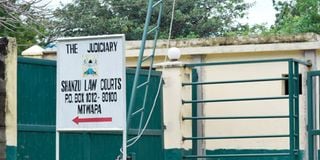Premium
Police probe child theft ring as women arrested

Shanzu Law Courts. Two suspects were arraigned in court after being arrested at a local hospital for allegedly stealing babies.
Police in Mombasa City are holding a woman and her house-help on suspicion of stealing a child.
This follows the duo's arrest at a local hospital where they had taken the two-days-old infant for a medical check-up but roused suspicion when they couldn’t account for when and where the baby was born nor provide prenatal records.
Medics at Premier Hospital in Nyali were forced to call the police when Ms Margaret Katini Mwasaka and her house help, Ms Clara Mugandi, fumbled for words when asked to provide the baby's medical history.
Both are currently detained at Central Police Station, where detectives from the Child Protection Unit are seeking to unravel the mystery of the baby’s birth.
Ms Mwasaka, purportedly the child’s mother, took the baby to the clinic for a check-up on February 15 accompanied by her house-help. She, however, could not provide basic information that a mother should not forget just two days after giving birth.
“Ms Mwasaka could not account for when and where the minor was born and could not give the prenatal history,” said police Inspector Francis Maina, who is investigating the case.
The suspects were arraigned at the Shanzu Law Courts, where detectives asked to continue holding them for two weeks to conclude their investigations.
Mr Maina informed Senior Principal Magistrate Yusuf Shikanda of his suspicions that the two women may be part of a child trafficking ring. The sleuth said he had also checked with the hospital and confirmed that Ms Mwasaka lacked any medical records documenting a nine-month pregnancy and the alleged birth of a baby in February.
“Upon preliminary inquiry at the hospital, I established that Ms Mwasaka had visited Premier Hospital October 2, 2023, and a diagnosis done which concluded that she had no evidence of pregnancy,” said Mr Maina.
Trafficking syndicate
This revelation, the policeman told the court, firmed up his suspicions that the two women may be part of a child trafficking syndicate trading in newborns.
He said detectives will conduct a thorough medical assessment of the minor, who is currently in hospital. They will also interview potential witnesses and obtain DNA evidence to determine the child’s parentage.
“Other suspects [who are] part of the ... syndicate are yet to be arrested. Investigations are ongoing to locate and establish the biological parents of the minor,” Mr Maina told the court.
He expressed fears that the suspects might interfere with witnesses if released on bond.
“Ms Mwasaka has been communicating with other parties and, as such, there is need to forensically examine her phones.”
Ms Mwasaka, through her lawyer, Mr Paul Magolo, contended that bond was a constitutional right and that the State had not provided any compelling reasons to continue holding them.
“We see no justification to prolong our detention. Our mobile phones are in the possession of the police, so there is no basis for further detainment,” the suspects told the court.
Mr Magolo argued that investigations should come before arrest, not the other way around.
“Ms Mugandi was Ms Mwasaka’s house-help, nothing has been stated against her. We urge the court to release the respondents on lenient bond term,” he said. The magistrate allowed the police to detain the suspects, noting the lack of denial, or indeed any response, to the allegations presented by the State.
The court agreed that thorough investigations were necessary to determine the parentage of the child and the possible involvement of the suspects in an organised crime syndicate.
“If the narrative by the State is anything to go by, I agree that there is reasonable suspicion that we could be dealing with a case of child trafficking. That is not a matter to be taken lightly,” Mr Shikanda said.
He noted that the suspects' potential awareness of incriminating information in their call data or phone records could pose a risk if they were released, allowing them to alert their associates and evade justice.
On Ms Mugandi, the court said there is need to have her investigated since she did not deny accompanying her employer to the hospital.
“A house-help would surely know whether or not her employer was expectant and had given birth, unless she was employed after the child was received in whatever manner. There is need for the police to know the extent of her involvement in the alleged crime, if at all,” said the magistrate.
The court concluded that the State had , on a balance of probabilities, advanced compelling grounds to warrant the suspect’s continued detention and that their freedom at this stage could jeopardise the investigations.





